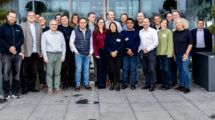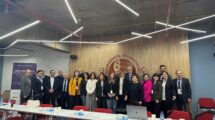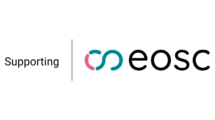On International Women’s Day, the “SEE Community Hub – female edition” launched with an online coffee chat, a great opportunity to greet and meet female practitioners and members of the GÉANT community from the South East Europe and discuss topics around gender equality and participation of women in technical fields.
The attendees, who were gathered not by specific role but by affiliation to the region, had a lively conversation on a current positive trend: female representation in Science, Technology, Engineering and Mathematics (STEM) fields across the South East European (SEE) region has been increasing over the past decade mostly in the fields of Engineering and Technology with IT taking the leading role.
Embracing change and fighting stereotypes
In the region, while over 20 years ago less than 10% of women studied IT in male-dominated classrooms, today these numbers have risen to a staggering 40%. The main reason for this shift could be that IT is increasingly becoming the first choice of study path when looking for a secure, well-paid job position later on. Combining this with the diminishing influence of traditional gender role division in society, increased mobility of the young population and strong embrace of modern cultural styles, SEE women feel motivated and empowered to take on the change.
Very interesting statistics show that in some of the SEE countries[1] female students are more likely to finish their studies on time with a higher GPA compared to their male counterparts. Furthermore, compared to the 40% in enrolment, the ratio of female graduates per year is reaching an amazing 60%. IT companies also tend to describe their female employees as more diligent, detail-oriented, organised and comprehensive.
And while these stats are very promising, unfortunately, there are still stereotypes that the SEE region needs to fight against. Women working in STEM are still underpaid and are rarely seen in high-profile leadership roles. Could this be because they have lower expectations of being successful in their professional career? Or is this the result of male-endorsed stereotypes, such as believing that men are more talented in technical subjects? A large study[2] conducted in the Western Balkans shows interesting findings: 2/3 of women think that women are underrepresented in STEM, compared to less than ½ of men sharing this opinion. While over 95% of women think that Computer Science is an adequate field for women, only 81% of men agree with this statement. Finally, 51% of women think that they are better in Computer Science than men, while only 8% of men think that women are better than them.
Having in mind the power and grip that these cultural stereotypes have in our society and on our minds, it looks like the SEE region has to continue working hard on the topic of breaking the glass ceiling and showing to their communities that women are worthy of leadership positions, should be trusted and allowed to show their full potential, and be adequately compensated for it as well. The growing interest in studying STEM shows that SEE women are not afraid to face and prove these stereotypes wrong. To further help with these goals, various initiatives that promote and support women in STEM are active in the region such as the Regional Network of Women in STEM by RCC[3], events supported by UNDP[4], as well as the CIDR[5]’s Cyber Pathways for Women and the STEM Teacher Force funded by USAID.
The way forward
The online gathering on 8 March aimed at celebrating the good work done by all the people involved in the SEE research and education community towards better female representation in technical fields, and at highlighting the commitment of women in STEM in the region towards taking active part in the wider global community, including sharing lessons learned and best practices with other NRENs.
Continuing on the positive path shown by the research findings and stats mentioned above, the GÉANT project and global community represents a wonderful opportunity to showcase the potential of women in the SEE region. Despite the specific restraints when it comes to hiring and fostering talent, the SEE NRENs have introduced some “new blood” in the last project phase with several new young female task members. They all come from NRENs or university environments that foster their potential and support their goals of becoming valuable members of the GÉANT community. The SEE research and education communities strongly support gender equality and offer equal opportunities to women in terms of pay and career advancement as to men, but are still aiming to break the barrier of 30% ratio.
Thus, we are looking forward to organising more gatherings like this one in the future and to welcoming a more diverse group of SEE Directors!
[1] Based on historical statistical analysis of over 10000 students at the Faculty of Computer Science and Engineering, Ss. Cyril and Methodius University in Skopje, North Macedonia, cross compared with similar statistics in the SEE region
[2] Ferati, Mexhid, et al. “gender stereotypes and women participation in STEM Fields in the western Balkans: a scoping review.” Academic Journal of Interdisciplinary Studies 12.2 (2023): 228-239.
[4] https://www.undp.org/montenegro/news/advancing-women-stem-western-balkans







